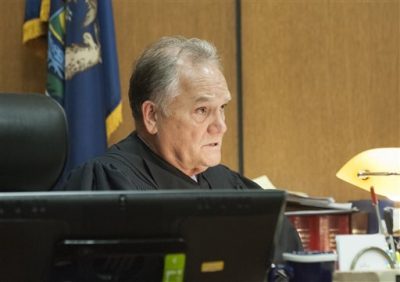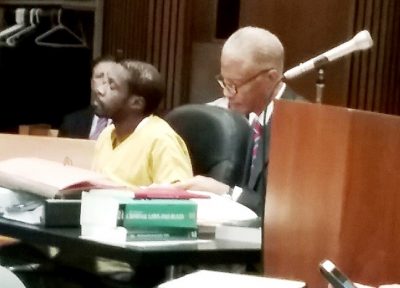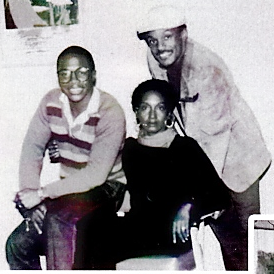(Video above shows Atty. Bryan A. Stevenson, who argued and won Miller v. Alabama case in Supreme Court, which declared JLWOP unconsitutional)
In prison since the age of 16, Kincaid re-sentenced to 30-60 years, recommended for immediate parole by judge
“If given the opportunity for release, I want to help juveniles outside” –Kincaid
“I only wish his mother could have been here to see this”—Aunt Mattie Fudge
By Diane Bukowski
November 8, 2016
(VOD: apologies for quality of photos; IPhone camera flash was off in court, forgot to turn it back on outside court.)

Judge James Callahan
DETROIT—“Ostensibly, this is going to be a wash,” Wayne County Circuit Court Judge James Callahan said as he re-sentenced juvenile lifer Timothy Kincaid to 30-60 years during a hearing Nov. 4.
“According to the probation officer, the surviving victim believes she is still alive through the intercession of Mr. Kincaid, in light of his protective conduct during the shooting. She even visited him while he was housed in the Department of Corrections.”
Judge Callahan noted that pre-sentence report guidelines indicated Kincaid had already served years past the time recommended, and that the probation officer believed Kincaid had been rehabilitated.
“The Judge wanted him released today,” Evelyn told Kincaid’s family and friends afterwards. “But he still has to see the parole board to determine the accuracy of the guidelines, and he also has good time they have to look at.”

Timothy Kincaid and attorney Gerald Evelyn
Evelyn said that although Michigan’s juvenile lifer resentencing statutes ban the use of good time, negotiations are proceeding on that issue in a federal lawsuit, Hill v. Snyder, filed by the American Civil Liberties Union. It is currently in front of U.S. District Court Judge John Corbett O’Meara in Ann Arbor, with the next hearing set for Tues. Nov. 17 at 10:15 a.m.
Evelyn said it helped that Kincaid still had a “6500 motion” proceeding before Judge Callahan, which VOD covered (date). Otherwise known as a motion for relief from judgement, a 6500 motion is the last chance to raise and exhaust issues in state court.
“I want to express my remorse to the court, to my family and to the victims,” Kincaid said. “I’ve been locked up 36 years now, and if given the opportunity for release, I would like to help juveniles outside. I was working in preventive programs while I was in prison.”

Timothy Kincaid supporters (l to r) maternal Aunt Mattie Fudge, Greg Kelly, Mike Hudson, Min. Ervin Bell
Kincaid has served 36 years of a juvenile life without parole sentence for the first-degree murders of three women, carried out by two older men in 1976, when Kincaid was 16. He testified at his trial in 1982 that he took the fourth woman into another room and aimed a shotgun at the floor to make the others think he had killed her.
Kincaid’s aunt Mattie Fudge, who attended with her granddaughter Matysha Neeley, was joyful at the outcome, as were three childhood friends of Kincaid’s, Minister Ervin Bell, Greg Kelly and Mike Hudson.
“I’m glad it’s finally over,” Fudge said. “I only wish his mother could have been here to see this.” She said Kincaid now has a grandson.
Kincaid’s mother Odessa Kincaid passed away in 2011, before either of her sons finally saw release from Michigan’s increasingly restrictive prison system. She and her daughter Vivian Kincaid campaigned both against juvenile life without parole and former Governor John Engler’s changes to the status of “parolable lifers.”
Waymon Kincaid was 19 in 1975 when he was sentenced to parolable life for second-degree murder. He was a plaintiff in a federal class action lawsuit filed by U of M’s Clinical Law program in April, 2005 on behalf of Kincaid, John Alexander, Kenneth Foster-Bey, William Sleeper, Robert Weisenauer, Eric McCollum, Gerald Lee Hessel and over 800 other “parolable lifers” in Michigan’s system.

Sister Vivian Kincaid Facebook
Prior to Engler’s term, judges sentenced defendants to “parolable life,” intending that if they showed evidence of rehabilitation, they could be released starting from 10 to 15 years after sentencing. Engler converted the civil service parole board into a board appointed by the governor.
One of the new parole board’s declarations was that “life means life.” It began keeping “parolable lifers” indefinitely, causing skyrocketing costs to the state’s prison budget.
The lawsuit did not ultimately succeed. However, Waymon Kincaid reportedly has finally been paroled subsequent to a Sept. 1 hearing, and John Alexander’s case is set for parole board consideration Nov. 14. The other named plaintiffs were all paroled far beyond the terms their judges intended.
Related stories:
#Justice4TimothyKincaid, #Justice4WaymonKincaid, #FreeCharlesLewis, #FreeEdwardSanders, #FreeDavidWalton, #FreeMichiganJuvenileLifers, #FreeMichiganParolableLifers, #TeardownPoliceStatePrisonNation






YouYou’ve worked so hard this THANKS FOR EVERYTHING !
Thanks from my Momma me an my whole family